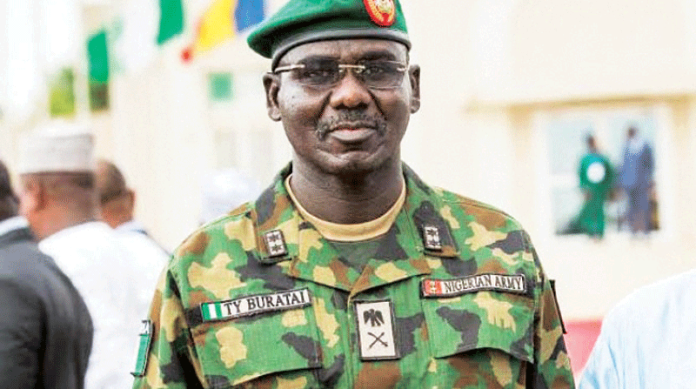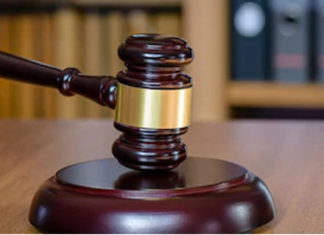The shooting to death of Muslim faithful last month by soldiers in the convoy of the Chief of Army Staff (COAS) has been described as abuse of human dignity and life. Senior Correspondent, ONYEWUCHI OJINNAKA, reports that some groups are calling for the United Nations’ probe into the matter.
The much condemned killing of Muslim Shiites by soldiers in Kaduna last December has continued to evoke more condemnations and calls for thorough investigation on what went wrong.
Over 100 people were allegedly shot dead by soldiers in the convoy of the Nigerian Chief of Army Staff (COAS), Lt. General Tukur Yusuf Buratai, when the convoy was trapped in a march organised by Islamic Movement of Nigeria to mark the birthday of Prophet Mohammed.
According to reports, a metal object was thrown at the General’s vehicle by unidentified person from the crowd and the soldiers mistook the sound of the metal as a gunshot and an attempt to assassinate the COAS and, in a quick response, opened fire on the crowd and killed a number of people.
Civil groups, organisations and individuals have unequivocally been condemning the killings, describing the incident as unjustified and an abuse on the people’s right to life.
Among the organisations are the Civil Liberties Organisation (CLO) and Socio-Economic Rights and Accountability Project (SERAP). They have, at different fora, condemned the extra-judicial killings of innocent citizens of Nigeria by the soldiers in the convoy of COAS.
Condemning the unfortunate incident, CLO said the incessant extra-judicial killings of innocent and harmless Nigerians by soldiers and other security operatives with impunity is an affront to human dignity and lives of people which is guaranteed by nature and law.
Also reacting to the incident, SERAP condemned the killing and forwarded an urgent letter of protest to Mr. Christof Heyns, the United Nations special rapporteur on extra-judicial, summary or arbitrary killings, requesting him to use his good offices to investigate the alleged attack by the Nigerian military on a Shia Muslim group in Zaria, Kaduna State, and other alleged killing of numerous Nigerians.
In the letter signed by its executive director, Adetokunbo Mumuni, SERAP stated that it is seriously concerned that the allegations of extra-judicial executions by the Nigerian military amount to serious violations of the right to life, guaranteed under Article 6 of the International Covenant on Civil and Political Rights to which Nigeria is a state party.
“The right to life is so fundamental because without it all other rights would be devoid of meaning. The right to life ensures that every person has a right to be free from the arbitrary deprivation of life, and places certain limitations on the use of force, including the action by the Nigerian military.”
“SERAP is concerned that the attack by the Nigerian military may amount to disproportionate and excessive use of force and not militarily necessary in the fight against Boko Haram. The Nigerian military should have done everything feasible to prevent the killings. ‘Everything feasible’ means precautions that are ‘practicable or practically possible, taking into account all circumstances ruling at the time, including humanitarian and military considerations’.
“As one of the state’s central duties is to protect life, it is particularly a serious breach of this duty when its own agents violate this right, leaving little hope that they will be effective in preventing violations by others. SERAP is concerned that human rights are brought under threat and the security of the country may eventually be put at risk if the power of the military is not properly controlled or if the military is not held to account for serious human rights violations.”
The organisation noted that the 1999 Nigerian Constitution (as amended) and international law recognise the inherent right of every person to life, and that no one shall be arbitrarily deprived of life. Indeed, everyone is entitled to the protection of the right to life without distinction or discrimination of any kind, and all persons shall be guaranteed equal and effective access to remedies for the violation of this right.
“Moreover, Article 4, Paragraph 2, of the International Covenant on Civil and Political Rights provides that exceptional circumstances such as internal political instability or any other public emergency may not be invoked to justify any derogation from the right to life and security of the person.
“Similarly, the UN Principles on the Effective Prevention and Investigation of Extra-legal, Arbitrary and Summary Executions in Principle 4 sets forth the obligation of governments, including Nigeria, to guarantee effective protection through judicial or other means to individuals and groups who are in danger of extra-legal, arbitrary or summary executions.
“The proportionality requirement under human rights law limits the permissible level of force based on the threat posed to victims by the Chief of Army Staff or his convoy. The necessity requirement imposes an obligation to minimise the level of force used, regardless of the amount that would be proportionate.”
The organisation stated in the letter to UN that it is the states’ duty to respect and to ensure that right to life entails an obligation to exercise “due diligence” to protect the lives of individuals from attacks, including members of the Shia Muslim group in Zaria.
In the light of the above, SERAP has therefore asked the special rapporteur to publicly express concerns about the allegations of use of excessive force by the Nigerian military and the unlawful killing of many members of the Shia Muslim group in Zaria; investigate the allegations and/or ask the Nigerian government to thoroughly investigate the allegations and bring to justice anyone suspected to be responsible.
It further requested the UN rapporteur to ask the Nigerian government to establish effective accountability mechanisms for human rights violations by its soldiers.













